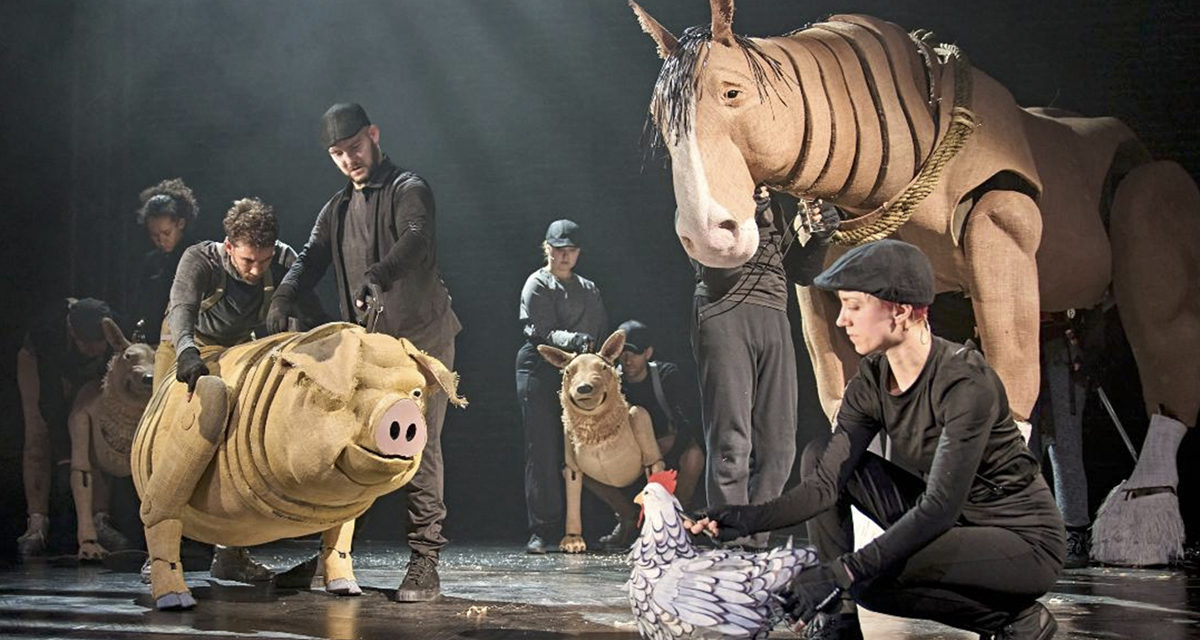“…… we have come to see a more divided politic, more polarization and less empathy. Things feel increasingly more dangerous”
A brand new staging of George Orwell’s Animal Farm is set to appear at the Theatre Royal Bath from Tuesday 1st to Saturday 5th March. Mick Hunter spoke to award-winning writer and director Robert Icke as he rehearsed the production, which he has also adapted, with the cast and the puppeteer Toby Olié, one of the creators of the National Theatre’s War Horse.
Born in Stockton-on-Tees, Robert Icke, 35, was inspired to enter the theatre world as a teenager after seeing Kenneth Branagh’s Richard III. He first came to national attention in 2013 with a production of George Orwell’s 1984 using surveillance cameras and video and went on to create radical re-workings of the Oresteia, Uncle Vanya, Mary Stuart and Hamlet, the latter starring Andrew Scott, at London’s Almeida Theatre. He regularly collaborates with actors including Lia Williams, Juliet Stevenson and Jessica Brown Findlay and his work has been seen in London’s West End, New York, Amsterdam and Stuttgart.
Animal Farm was Orwell’s response to Russia’s descent into dictatorship after the Revolution; what’s its relevance today?
The novel uses animals to think about humans, and the ways in which power structures and hierarchies form, even when everybody has made the conscious decision to get rid of those things. It’s a simple story: the animals have a revolution and clear out a corrupt old hierarchy to give themselves freedom, and then slowly piece by piece a corrupt hierarchy – of pigs – builds its way back again.
In my adult life we’ve not really been blessed with great political leaders in Great Britain – or even confident opposition leaders – although I struggle to see it as tyrannical, like human rule is over the animals. But certainly, we have come to see a more divided politic, more polarization and less empathy. Things feel increasingly more dangerous. The differences feel very real and you do start to hear talk of revolution as a possibility.
What was the appeal for you?
I like to do new things, and I had never made a show with puppets before, though I’d had a few ideas in my back pocket about them, to do with things like scale. You know, I can’t have three human actors of different sizes and do different tricks with them. But I CAN have three puppet versions of Boxer the carthorse. It’s an almost all-puppet cast and they all talk, and it’s been interesting working out what conversations puppets could plausibly have with each other and which feel… just not right. Not a problem that Orwell had to get around in writing prose! But if you think about the Muppets, through Babe, to Pixar films, there are lots of stops on the road in terms of how you pitch talking animals. I probably won’t go for real animals, but other than that, anything could happen.
Why do you find it necessary to rewrite or rework classic stories?
There’s always been a feeling in me that theatre is about repeating a ritual, like a birthday. Every year it is still your birthday, but it’s a different birthday because you are a year older and maybe the people at your party are different. For me it’s always felt like a form of dishonesty to pretend that there is a way to do any play or any production as the golden version that should be set in aspic.
Is Animal Farm designed for all ages?
I hope so. It’s not the jolliest of stories, but I think kids enjoy that. We’ll have to see how violent the violent bits are: we discovered in workshops there can be something very depressing and distressing about a puppet being killed. But access is hugely important to me and I’m not sure I’ve ever made anything where I wasn’t conscious of the thought that a 14 or 15-year-old might come and see it and enjoy it. Most people who work in and around theatre got hooked at around that age, including me. And I really trust young people as a sort of boring-ometer [laughs].
Apart from films, what’s your ambition for the future?
I live in London though, for the last few years, I’ve mainly been working abroad. And the dream ambition has been, for the last few years, to work out if there is any way to create a permanent ensemble company of actors, based in London, to make new work in English – in the way they have in Amsterdam, across the German speaking world, and in many other countries too. The leading actors I have worked with a lot over the years have now become friends and they have a huge appetite to do theatre, to build deeper, longer-term relationships. But could you pay them properly? What contracts could you offer? Could they have months off to go and film if they wanted to? People often say that model is now impossible in the UK. Perhaps it is. I don’t know the answer to that; but it would be exciting to try and find out.
Animal Farm tours to the Theatre Royal Bath from Tuesday 1st to Saturday 5th March. Tickets are on sale at the Theatre Royal Bath Box Office on 01225 448844 and online at www.theatreroyal.org.uk


